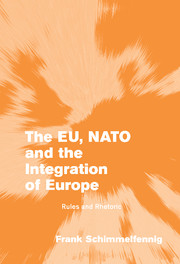Book contents
- Frontmatter
- Contents
- List of figures
- List of tables
- Acknowledgments
- List of abbreviations
- Introduction
- PART I Security, power or welfare? Eastern enlargement in a rationalist perspective
- PART II Expanding the Western community of liberal values and norms: Eastern enlargement in a sociological perspective
- 4 Sociological institutionalism and the enlargement of regional organizations
- 5 Eastern enlargement and the Western international community
- 6 The event history of enlargement
- Conclusion: the sociological solution to the enlargement puzzle
- PART III Association instead of membership: preferences and bargaining power in Eastern enlargement
- PART IV From association to membership: rhetorical action in Eastern enlargement
- Strategic action in international community: concluding remarks
- Appendix (Interviews)
- List of references
- Index
4 - Sociological institutionalism and the enlargement of regional organizations
Published online by Cambridge University Press: 22 September 2009
- Frontmatter
- Contents
- List of figures
- List of tables
- Acknowledgments
- List of abbreviations
- Introduction
- PART I Security, power or welfare? Eastern enlargement in a rationalist perspective
- PART II Expanding the Western community of liberal values and norms: Eastern enlargement in a sociological perspective
- 4 Sociological institutionalism and the enlargement of regional organizations
- 5 Eastern enlargement and the Western international community
- 6 The event history of enlargement
- Conclusion: the sociological solution to the enlargement puzzle
- PART III Association instead of membership: preferences and bargaining power in Eastern enlargement
- PART IV From association to membership: rhetorical action in Eastern enlargement
- Strategic action in international community: concluding remarks
- Appendix (Interviews)
- List of references
- Index
Summary
Constructivist premises and concepts
In contrast to rationalism, sociological approaches to the study of international relations and international institutions are based on a social (structural) and ideational ontology and on the assumption of appropriate action.
Idealism. Constructivists regard ideas, in the broadest sense of the term, as the most fundamental causes of social phenomena. They do not deny the causal influence of human nature or material conditions altogether but argue that “only a small part of what constitutes interests is actually material” (Wendt 1999: 115) and that “the manner in which the material world shapes and is shaped by human action and interaction depends on dynamic normative and epistemic interpretations of the material world” (Adler 1997a: 322).
Structuralism. Neither the ideas that shape the identities and interests of the actors nor social phenomena in general can be “reduced to aggregations or consequences of individuals' attributes or motives” (DiMaggio and Powell 1991: 8). Ideas have a structural, “intersubjective” quality; they are “collective representations” (Durkheim) or “institutional facts” (Searle). Sociological institutionalists regard the environment of social actors as a cultural or institutional environment structured by collective schemata and rules.
Sociological explanations, therefore, do not start with actors and their exogenous corporate identities and interests. Rather, they problematize and endogenize identities, interests – and, ultimately, actors as well. That is, they analyze and explain them as products of collective ideational structures and social interactions that are subject to cultural variation and historical change.
- Type
- Chapter
- Information
- The EU, NATO and the Integration of EuropeRules and Rhetoric, pp. 68 - 76Publisher: Cambridge University PressPrint publication year: 2003

